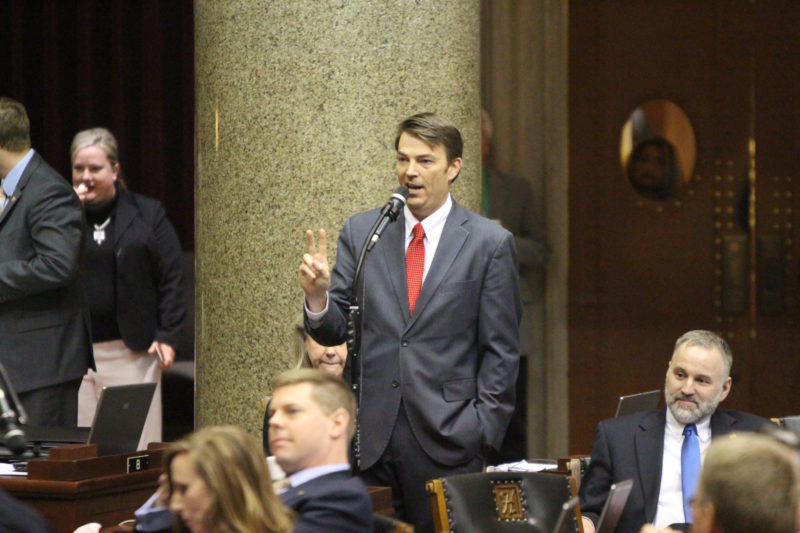JEFFERSON CITY, Mo. – The house perfected a bill aimed at stopping a minimum wage increase in St. Louis from going into effect.
Rep. Jason Chipman’s legislation would prevent any city, town, or other municipality from raising their local minimum wage above the state’s own minimum hourly rate. Previous statutes passed by the legislature in 1998 and 2015 were both found invalid by a Supreme Court decision last week, finding they both committed Hammerschmidt violations as they were tacked onto other bills.
The language of Chipman’s legislation takes a much more direct approach to stopping minimum wage hikes by municipalities. It has been fast-tracked by the Missouri House and is expected to be third read and passed Thursday. At one point, Speaker Todd Richardson got off the dais to defend the bill during an inquiry from Rep. Jon Carpenter.
Richardson defended the Republican caucus after Carpenter accused some Republican membership of being disingenuous when they told him they would welcome a statewide minimum wage hike. He also denounced Carpenter’s comments that Republicans were attempting to stifle debate from the Democrats, especially after an hour-plus long discussion on an amendment offered by House Minority Floor Leader Gail McCann Beatty.
The Speaker also defended the idea of keeping the wage at a steady level across the state.
“The issue here today is whether we ought to have a patchwork of rules across the state or if we want to give people the right to hire employees for the state minimum wage,” Richardson said.
Democrats loudly voiced their opposition to the minimum wage raises. Beatty’s amendment, as well as another from Rep. Tracy McCreery, sought to raise the statewide minimum wage to $15 per hour and $11 per hour, respectively. Beatty withdrew her amendment right before a vote, but McCreery’s was voted down 100-45, almost entirely along party lines. Rep. Bruce Franks refuted arguments minimum wage jobs mostly went to young workers, especially in his community.
“At the end of the day, there are people in the city of St. Louis that aren’t making livable wages,” Franks said. “In your communities, they might be stepping stone jobs… but these jobs are jobs.”
In the discussion on Beatty’s amendment, Republican Reps. Rick Brattin and Marsha Haefner voiced the argument that a minimum wage increase could decimate small businesses.
“We would be shutting doors everywhere within these cities,” Brattin said. “I understand the lady’s heart, but the reality would be completely devastating to these areas.”
Haefner detailed her own small business, which includes a retail greenhouse in South County, saying she would likely have to lay off workers if she was forced to pay her part-time workers significantly more than she does now, which is already a bit above minimum wage.
“Very few small businesses could absorb this kind of a cost,” she said. “This is the most job killing policy I had ever heard of.”
Some Democratic representatives were less receptive to the idea businesses would suffer. Rep. Clem Smith, D-St. Louis, said if a business failed because of a minimum wage hike, then they simply had a bad business plan.
“Every business does not have the right to exist,” Smith said.
Rep. Peter Merideth, a St. Louis city representative, urged members of the chamber to consider what higher wages meant for workers and employees who would patronize businesses and spend their money.
“If we want to draw businesses in this state we do that by creating a consumer base that has money to spend on those products,” he said. “We can’t continue to pretend the only side of supply and demand economics that matters is the supply.”
The bill was easily perfected and could be passed by the House Thursday.



